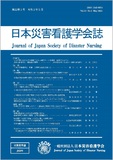Japanese
English
- 有料閲覧
- Abstract 文献概要
- 参考文献 Reference
要約
目的:本研究では,要介護者と生活する家族が豪雨災害時にどのような避難行動をとっているのかを明らかにすることである.
方法:要介護者の家族が豪雨災害時にどのような避難行動をとったのかを半構成的面接法によって聞き取り,質的帰納的に分析した.
結果:分析の結果,要介護者と生活する家族の豪雨災害時の避難行動は,【楽観視する】,【行政や報道に判断をゆだねる】,【被災による混乱】,【避難への躊躇】,【過去の豪雨の経験にとらわれる】,【危機の兆候を調べる】,【避難の勧誘に従う】,【日頃からの備え】,【要介護者を救うための調整】の9つのカテゴリーとして抽出された.
まとめ:平常時から外出する習慣を持つことは避難行動の実行可能性を高め,豪雨災害に関する知識や自宅周辺の土地の特徴を把握しておくことは適切な避難開始の判断につながるという示唆が得られた.
Purpose: This study explores the behavioral characteristics of caregivers living with vulnerable family members during flood disasters in Japan.
Methods: Family caregiver behavioral patterns during flood disasters were systematically investigated. Data were collected through semi-structured interviews with caregivers living with vulnerable family members and were evaluated by qualitative analysis.
Results: The following nine behavioral patterns of caregivers during flood disasters were identified: “having a strong optimism bias,” “being influenced by public administration and mass communication,” “feeling confused by the suffering of vulnerable family members and hesitating to evacuate,” “having previously experienced a flood disaster evacuation,” “being aware of flood disaster signs,” “following evacuation guidance,” “following disaster preparedness plans,” and “coordinating with institutions to help vulnerable family members.”
Conclusions: The results suggest that caregivers regularly involved in outdoor activities with their vulnerable loved ones are better prepared for evacuation. In addition, the effectiveness of evacuation also depends on prior knowledge of flood disasters and on the depth of their understanding of the characteristics of the place where they reside.
Copyright © 2021, Japan Society of Disaster Nursing All rights reserved.


